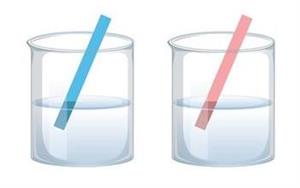
PUMPA - SMART LEARNING
எங்கள் ஆசிரியர்களுடன் 1-ஆன்-1 ஆலோசனை நேரத்தைப் பெறுங்கள். டாப்பர் ஆவதற்கு நாங்கள் பயிற்சி அளிப்போம்
Book Free DemoThe chemical properties of water are listed below:
- Action towards litmus paper
- Stability
- Catalytic nature
- Reaction with metals
- Reaction with non-metals
Action towards litmus paper
Pure water is neutral; hence it does not react with litmus paper.

Reaction of water (neutral solution) on litmus paper
Stability
Water is a chemical molecule that is highly stable. When heated to normal temperatures, it does not break down into elements. However, when heated to 2000°C, 0.02\ % of the water decomposes into hydrogen and oxygen gas.
Catalytic nature
In a variety of reactions, water acts as a catalyst. In the presence of sunlight, perfectly dry hydrogen and chlorine gases do not react. However, when there are traces of water present, the reaction results in an explosion, resulting in hydrogen chloride.Reaction with metals
At room temperature, water reacts with metals like sodium, potassium and calcium vigorously. When sodium combines with water, hydrogen gas and sodium hydroxide solution are produced. The hydrogen gas catches fire and burns as a result of the heat produced in this reaction.
Magnesium is a little more sluggish. It produces hydrogen and magnesium hydroxide solution when it combines with hot water.
Many other metals form oxides and hydroxides when they react with water. Iron is one of these metals that produces iron oxide, commonly known as rust. Corrosion is the slow and gradual rusting of iron.
Copper will not react with water at any temperature. That is the reason we use copper for making pipes and boilers.
Reaction with non-metal
Water gas (CO_2+H_2) is produced when red hot carbon (coke) reacts with steam. Hydrochloric acid is produced when chlorine gas dissolves in water.